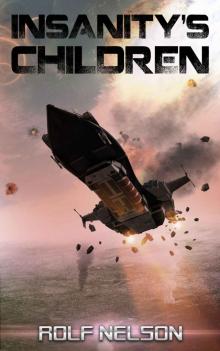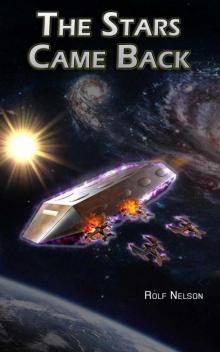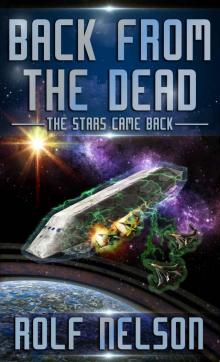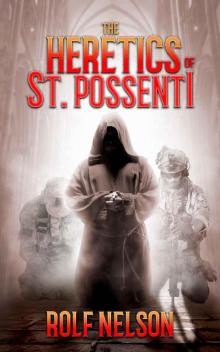- Home
- Rolf Nelson
Back From the Dead Page 4
Back From the Dead Read online
Page 4
Dopestick chuckles and kicks a stack of one-liter water bottles off the ramp. “One each. You can fight over ’em now or later, your choice. We got bets on that, too,” he says with an evil grin. “See some of you soon!” The transport lifts up and speeds away.
The passengers are unsteady as they recover from the effects of the sleeping gas. Some start walking or crawling toward the water bottles. Next to Helton is a bearded Sikh in his late forties, adjusting his turban. He looks at the retreating flier, then at Helton. He speaks quietly, in a one-meter voice, “Name?”
“Helton. Can’t say I’m glad to meet you.”
“Harbin. The same.” He starts to flex and loosen up, looks at the dead passenger, shakes his head. “Stupid.”
“What the hell happened?” Helton asks, as they both move carefully to their knees.
“Pirates. They can sell the ship and cargo. People are harder. Inside guys put knockout gas in the air, but they get skittish about just spacing everyone. So, entertainment, then slavery in a prison mine where there isn’t a lot of paperwork filed, I expect.”
Helton glances around at the terrain. “Sssshhhhiiiiit.” He looks back at Harbin, then behind him. “That doesn’t look good,” he says, nodding at a small group of tough-looking, young punks. Some of the other passengers have noticed the gathering as well.
Harbin rises to his knees, casually glancing back out of the corner of one eye, then bending as if stretching, he surreptitiously picks up an oblong rock. “Good call. Can you move okay?” Helton stretches carefully, grimaces, and nods. “Right. Follow my lead.”
Harbin slowly stands up, flexes, and moves toward the six punks. They look at him suspiciously, also stretching, flexing, and making fist-into-palm motions. He pauses to leer at one of the ladies, then grins a wicked grin and approaches the men. They spread out, preparing to fight him all at once, but when he’s almost within striking range, Harbin says in a harsh whisper, “Kill the other men, then rape and kill the women and kids, take all the water? Make for an easy walk to the mine.”
“Shit, yeah!” one says. The others smile.
“Kill ’em, then rape ’em,” says another. “Can’t hurt you that way, and it’s faster.”
“I like the way you think!” says a third.
“Thought so,” Harbin replies, with an evil smirk. “Here’s how.”
He steps closer, waving them in to huddle for a quick plan. Then in a whirl of kicks, chops, lunges, rock-smashes, a head butt and a neck twist, five of the thugs lay dead, or at least out cold and bloody. He looks around to see Helton still struggling with the sixth and biggest. Harbin steps in and strikes the thug in the back of the head with casual, efficient precision, laying him out quite effectively.
“Thanks,” Helton says, panting slightly.
Harbin, not the least bit out-of-breath, answers, “Thank you. Four isn’t a problem; six is pushing it.”
“Well,” says Helton, looking down at the bodies, “that helps the water problem, anyway.”
The others have scattered, putting distance between themselves and the violence, though a few grabbed water bottles during the confusion. Adults shield their children behind them. As Helton and Harbin walk over to the small heap of remaining bottles, everyone falls silent, motionless, suspicious. Helton squats and takes a bottle, then hands a second to Harbin. They look around, evaluating their position.
A frail elderly man in a monk’s habit, sitting between two groups of passengers, slowly rises to his feet, then walks stiffly toward them. They watch him silently. He stops a few yards away and regards them intently. His face is ashen and jaundiced — even the whites of his eyes are yellow — but his expression is sharp and inquiring. “What now, my violent young friends?”
“Well,” Helton takes a drink, “we make a plan, and we get everyone to safety.”
“I admire your faith, my son,” the monk says with a small smile, “but you seem to have more hope than sense.”
“Doesn’t your God preach ‘God will provide?’” Harbin asks skeptically.
“Yeah,” says Helton, “Right now all He’s provided is an abundance of shortage.”
“Perhaps. But He provided them,” the monk waves at rest of the passengers, “with you.” He nods at the fallen bodies.
“Which only proves He’s got a really odd sense of humor,” Helton says.
“Perhaps. But you don’t look like a punch line to me.”
Harbin says grimly, “Not a perfect situation, but we’re not dying of thirst just yet.”
Helton looks sharply at Harbin, closes his eyes, takes a deep breath, and says (mostly to himself), “Liabilities are obvious. Assets. Observe, orient, decide, act.” He looks at the people, the water bottles, the terrain. Suddenly he squints, peering at one of the mesas. Surprise lights up his face. “Hey, hey-hey-HEY! I … I know that rock outcrop! I know this place. I’ve been here before!” He paces back and forth, gesticulating like a crazy man, energetically pointing out things and muttering to himself, trying to recover an old faded memory. Everyone else eyes him cautiously.
“The basalt was over there, and the granite that-a-way, terraforming cut through silicates there.” He snaps his fingers sharply. “GOT IT! Sun’s coming up over there. Gonna get hot, damn hot. That valley he pointed us down is a long way to the mine, but it should be easy walking. There’s a shorter way around that side, but it’s rough. Lots of sharp igneous rock, an old TFP cut. How, how, how?”
“Could we cut ahead, take a transport, come back to get them?” Harbin asks.
“Huh? Oh. Um… No. Well, maybe. Let me think.” Helton taps his chin, looks around acutely at the features of the landscape, becomes oblivious to the people around him. Then the monk collapses, hitting hard. His face is pale, jaundiced, and sweating. Helton snaps back and moves to the monk’s side. “What’s wrong?”
“Nothing that has not been going wrong for months,” the monk says between labored breaths. “I was headed home to the abbey for my final voyage. Looks like–” he winces at a jab of some internal pain, “-it might be a shorter trip than I planned.”
“No, you’re going to make it!” Helton insists. “We’ll all make it!”
“Would that it were true. But no, I … I’ve done my work in this world. It’ll spread the water.”
“No, you’re not done yet!”
“With my kidneys, I’ll be visiting with God in a couple of hours. Sorry to disappoint you.”
“Well,” says Helton, “we’ll do what we can do.” The monk smiles at him faintly. Helton stands and looks around again, focusing, thinking.
He sees: Harbin, searching the dead men for useful items, taking their jackets and belts. A mesa. Six groups of passengers. An outcropping of rock. Ten water bottles in a heap. The sun, about twenty degrees above the horizon. The monk. Another rock outcropping.
Then he decides: “Okay. Unless someone has a better idea, here’s the plan.” He squats by the water bottles, tossing them to anyone who doesn’t already have one, then an extra to each of the groups that look to be families. Harbin starts distributing jackets to underdressed passengers.
“Harbin and I will cut over that way along the other side of the mesa and–”
“But they said the way to the mine was that way,” a passenger objects, pointing down the valley.
“Just ’cause they handed us a crap sandwich doesn’t mean we have to eat it. Just deal with it. Now, the sun is still low, so you can move into and through the shadows on the east side of the canyon for a while. By noon it’ll be getting hot. Find a shady spot, lie down, and sleep if you can. Move out again in the evening as it cools. If you come across any water it’ll have a lot of alkaloids, so DON’T DRINK IT! And–” Cutting himself off, he pats at a few of the many pockets in his traveler's coat. His face brightens. “Ha! Here.” He pulls out a series of tiny flashlights, checks them and tosses one each to four groups.
“Always kept a supply of these handy for the kids. You’ll need to march a
ll night to keep from freezing, but don’t go too fast or you’ll sweat and get dehydrated and exhausted. Save your water until tonight if you can. A couple of big turns down the canyon, you’ll see the prison mine. Find a spot just around the bend, out of sight on the west side, and wait for us. Harbin and I’ll take the cut around the other side of the mesa. We’ll sneak in, grab something flyable, zip out to grab you, and get as much airspace as we can between us and them as fast as we can. We’ll aim for sunset in two days, so be ready to move. If we don’t pick you up before sunset in three days, go in together as a group, and you’ll have to take your chances, because in three days…” He shrugs. “If you are stopped and cold, huddle together. Questions?”
A man standing with a woman and two children speaks up. “Shouldn’t we bury these guys?”
“No. No time to waste before the heat sets in. Anything else?”
The monk holding out his water bottle. “I won’t need this.”
“Yes, you will.”
Gritting his teeth, the old man quietly demurs. “No. It won’t make any difference for me, might save one of you.”
“Thanks.” Helton takes the bottle gently. “We’ll come back for you.”
“Only if you can do so safely.” The monk motions feebly for Helton to come closer. Helton bends down. The monk whispers in his ear and presses a small medallion into Helton’s hand. It’s metal, about forty millimeters across, red, with a black enamel Possenti cross, like a mil-dot reticle with two short stadia lines on the horizontal crosshair, and two short and one long on the vertical.
Helton’s expression grows more serious. He stands, putting the medallion into his pocket, and looks at the group of passengers arranging themselves with renewed hope. “Well, good luck. Hopefully we’ll see you all in two days.”
One of the women comes up and hugs him. “Thank you,” she says. “Good luck!” The others pass by Harbin and Helton, giving hugs or handshakes, with murmurs of “Luck”, or “Bless you”, or “Give ’em hell.” As they move off down the canyon, Harbin takes a close look at the monk, sitting slumped on the ground. The monk looks at Harbin and shakes his head carefully, wincing. He straightens up slightly, adjusts his position, and settles into a meditating position.
Harbin and Helton start walking. After two dozen paces, Harbin stoops, picks up a smooth rock a bit smaller than a baseball, hefts it, and turns toward the monk, now sitting facing the sunrise. He winds up and hurls the rock, hard. There is a soft crunch as it smashes into the monk’s skull, and a flopping sound as he collapses over onto the ground. Helton looks at him, appalled.
“Alone in a desert dying of thirst and organ failure,” Harbin says, flatly. “Not a good way to go.” He turns to address the monk, salutes him, and speaks in a respectful, sincere tone. “May your God watch over your soul.” Turning back to Helton and waving his hand in the direction of the mesa, he bows very slightly. “Lead on, gubernator.”
Helton and Harbin scramble along a narrow flat spot at the foot of the mesa, in the long shadows cast by the morning sun. To their left, the steep side. To their right, a deep semicircular valley sweeps down, bearing the regular but rough marks of a terraforming machine.
The other passengers walk through a sandy valley bottom several kilometers away, steep canyon walls rising around them. As they march along, the stronger help the others who are struggling. A man lifts a young girl to his shoulders, and she slumps down over his head. Her mother, tired and visibly scared, flashes a faint smile of thanks.
Helton’s traveler’s coat flaps in the wind as he and Harbin hop from rock to rock, moving smoothly along, half a dozen paces apart. They’re making rapid progress. The shadows shorten as the planet spins and the sun works its way overhead.
At the top of a valley, breathing deeply from their swift travel, Helton and Harbin stand beside each other, arms akimbo, trying to survey the way ahead. Harbin points out a path.
“Where did you serve?” Harbin asks.
“Serve?”
“You carry yourself like a veteran.”
“Thanks,” says Helton. “Army on Asimov Three. I did the traditional two years everyone in my family did.” He grins and assumes a haughty voice. “I attained the exalted command rank of corporal, second class, promotable.”
“You didn't re-enlist?”
“The five hundred they asked me to pay for a five-year reenlistment and one-grade promotion didn’t quite strike me as a good investment.”
Harbin laughs out loud and nods knowingly. “I’ve worked with that sort of force before. Payoffs and corruption throughout.”
“You’re a soldier?” Helton asks. Harbin shrugs to indicate more or less. “Mercenary?”
“I prefer ‘freelance righter of wrongs.’ My wife describes it as ‘negotiation failure contingency planner’. To keep from scaring people.”
“Anywhere in particular? Lots of stuff going on right now.”
“I work for a Plataean unit wherever it goes. Here and there.”
“You Plataean?” Helton asks, and Harbin nods. “Now I believe some of the things I’ve heard about them.”
“An honest reputation is worth far more than one not earned.”
“Native or earned citizenship?”
“Born there, but Plataean citizenship is always earned. Passed my Komenagen at 19 with an 8. Bothered my parents that I passed the test in the field with the only person in a generation to score a 130.”
“130? A perfect score? And you barely passed? Ouch.”
“I was a punk, once. Someone looked past the score, looked at me. It worked out well enough.”
“She mind you being gone, out to places like this? Your wife, I mean.”
“Hadn’t planned on being here. She likes me being good at what I do, and standing by her. A steady income working for honest people is beneficial for a marriage, too.”
“Glad you’re on my side,” Helton says. “You are on my side, aren’t you?”
“We have a strong mutual interest in each other’s success.”
Helton looks at him steadily, acknowledging what Harbin isn’t saying. “What now? Rest until it gets cooler?”
“You’re in charge. But since you asked, I’d say we should look for a good shadow to hide in.”
“I’m in charge, huh?”
Harbin shrugs, a matter-of-fact expression on his face. “You know the planet, the mine, the terrain. You made the plan and took command in a very decisive way. I’m just along for the scenery until we reintroduce ourselves more properly to those who, as you said, handed us this crap sandwich.”
“Well, then I guess…” Helton suddenly cocks his head to listen, then scans the horizon and the rocks around them. He hears a slight hum. “Damn. Flier of some sort. See any place to hide?”
They both take off at a run along the scree slope, trying to find something to hide behind. They bounce along the slope rapidly, come around a small spur, then see a dark opening in a narrow draw, partially covered by rocks and debris. They scramble quickly over to it and slide down the loose rocks and sand half-filling the mouth of a cave.
Cave
Helton and Harbin lie in the cave, panting quietly but otherwise motionless, listening intently. The humming of a flier grows louder as it approaches, then Dopplers down and fades away. They are about to move again when they hear the sound of another flier approaching, then fading. Helton looks around the cave while Harbin keeps his eyes on the entrance.
“Good a place to rest as any. Cool, out of sight,” Helton says. Harbin grunts in agreement. They both lay back and relax in the half-light from the partially blocked entry, looking around more carefully to take stock of their situation.
The cave is flat-bottomed, with nearly perfectly round walls and ceiling — like a culvert one-third filled with sand — about three meters diameter, going back as far as they can see, straight into the dark. Rocks and debris are scattered about the floor, and the walls are even but not very smooth. In the poor light they can
’t see very well. Helton says, “This cave isn’t natural.”
Harbin looks at him skeptically. “Looks natural enough to me.”
“No. Too symmetrical.” He shakes his head, examining the wall more closely. “Eroded, so it’s been here a while, but it’s not the sort of tube that would occur naturally in this kind of rock. Lava tubes are usually in lava. Wrong geology. Weird.”
“If you say so. Not my field.”
Helton rubs the wall and finds it is much smoother than it first looked. He mutters quietly to himself, “A long while.” Standing up, he brushes himself off and walks slowly back into the cave, keeping one hand on the wall while tapping and sweeping his foot back and forth in front of himself gently, checking for holes, booby traps, or anything suspicious. He stops, pats his pockets, digs out one of his tiny flashlights, then clicks it on and shines its dim beam around.
The dark rock reflects little light, and the tunnel becomes gloomier as he walks farther in. Ahead, faintly discernible in the feeble beam, is a low pedestal in the center of the tunnel, a simple hexagonal column of rock with no symbols or details. He approaches cautiously. On the pedestal is a large book with no markings, the pages nearly flush with the edges of the binding. He picks it up and tries to open it, but it resists, shut fast with no obvious locking mechanism. He finds the end of the tunnel a short distance beyond the pedestal, then turns and walks slowly back to the tunnel entrance.
“Anything?” Harbin asks, still looking out the entrance, talking over his shoulder.
“Dunno. What do you make of this?” Helton hands the book to Harbin, who examines it briefly.
“Book?”
“Really? Never would have guessed that.”
“Old desert hermit’s bedtime stories?” He hands it back.
“Maybe. Let me see here.” Helton examines the book more closely, then takes off his traveler’s coat and flips up the cape, revealing a large flat pocket between the insulating lining and the tough outside layer, sized for storing things like maps. He tucks the book into it, where it barely fits, so it will fall high on his back, like a pack.

 Insanity's Children
Insanity's Children The Stars Came Back
The Stars Came Back Back From the Dead
Back From the Dead The Heretics of St. Possenti
The Heretics of St. Possenti